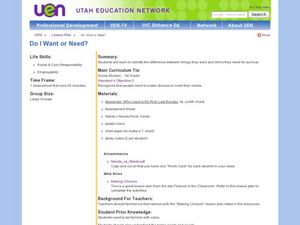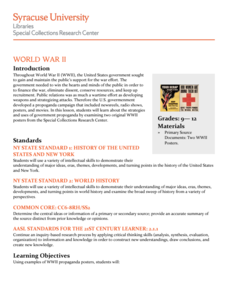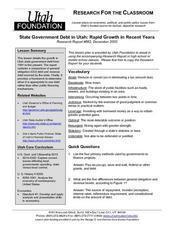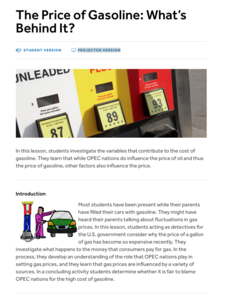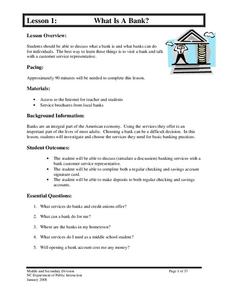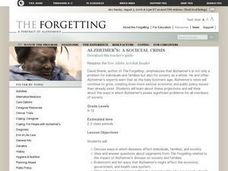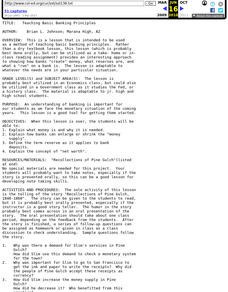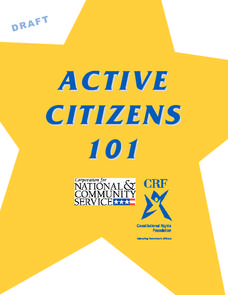Curated OER
Do I Want or Need?
Young scholars explore wants and needs. In this introductory economics lesson, students use a "pinch card" to display whether a familiar item is a "want" or a "need". Young scholars listen to the book Alexander used to be Rich on...
Syracuse University
World War II
During World War II propaganda was as important to the war effort as the soldiers in the field. Scholars consider how the government communicated messages of patriotism with propaganda by examining pieces from World War II. Then, they...
Federal Reserve Bank
History of Money and Banking in the U.S.
Why was there a lack of confidence in the money and banking system of the early United States government? What historical events led to the establishment of the Federal Reserve System? Here you'll find reading materials and worksheets to...
Curated OER
Your Role as a Taxpayer: Why Pay Taxes?
High schoolers evaluate the basic rationale, nature, and consequences fo taxes. They describe why governments need taxes as revenue to provide goods and servicesin this series of activities.
Curated OER
Let's Find Out About Money
First graders investigate the uses and development of money as part of the study of finance. They focus upon the recognition of different coins and identify the value of each. Then students solve problems involving money and coins.
Curated OER
State Government Debt in Utah: Rapid Growth in Recent Years
Students examine growth of debt in Utah state government from 1991 to present, compare general obligation debt and revenue debt incurred by state, identify four primary methods used by governments to finance projects, and complete...
Council for Economic Education
Satisfaction Please! (Part 1)
The topic of consumerism seems easy to those who participate actively in the US economy, but pupils who are new to economics may see the idea as foreign. Help them understand their rights as consumers and what to expect when interacting...
Curated OER
The Price of Gasoline: What's Behind It?
When gasoline is in high demand and on short supply, OPEC can raise the price to turn a significant profit. Help learners understand the economics behind demand, profit motive, and monopolies with a activity that focuses on OPEC and...
Curated OER
Paying Off Student Loans
Learners plan financing postsecondary education and explain how loan repayments work. They build a spreadsheet, listing the categories of expenses in the left hand column.
Practical Money Skills
Cars and Loans
Most teenagers want to buy a car, but do they know how much it really costs? Calculate the cost of purchasing a car, securing auto insurance, and maintaining the new investment with a thorough and engaging personal finance lesson.
Practical Money Skills
Protecting Your Money
How can you tell if a commercial or salesperson is being misleading? Encourage your learners to protect themselves and their money with a instructional activity about consumer rights. They review laws that keep consumers safe from faulty...
Practical Money Skills
Shopping Wisely
Work on making good shopping choices with a fun economics project. Kids analyze the differences between brand names and generic products, bigger and smaller units for purchase, and different places they can shop for different items.
iCivics
Counties Work
Turn learning into a game by asking pupils to play an online interactive activity! Learners choose their own characters, departments, work toward building the population of their towns, earn money, and must maintain an approval rating...
Visa
Money Responsibility
Introduce young learners to the important life skill of responsibly managing money and recording how much they spend and save.
Visa
Consumer Awareness
Help your pupils become wise consumers and avoid becoming targets for consumer scams and fraud. Here you'll find a PowerPoint presentation, instructional guidelines, worksheets, and suggested activities for developing shopper strategies...
North Carolina Department of Public Instruction
What Is A Bank?
You're never too young to learn about banking and personal finance. Use a set of seven banking lessons to teach middle schoolers about checking and savings accounts, interest rates, loans and credit cards, and safety deposit boxes.
Curated OER
Alzheimer's: A Societal Crisis
High schoolers discuss ways in which diseases affect individuals, families, and society, and view and answer questions about segments from The Forgetting related to the impact of Alzheimer's disease on society and families. They...
Curated OER
Charter Schools: Can They Survive in Utah?
Students discuss the challenges charter schools face in receiving similar funding as districts. They explore possible policy solutions to the problems faced by Utah's charter schools. They Investigate how government services affect the...
Curated OER
A Trillion Here...A Trillion There
In this working with large numbers instructional activity, students are given the finance statistics for the US and the world for the 2006-2007 year. Students solve 11 problems including finding averages and percentages for the given...
Curated OER
Teaching Basic Banking Principles
Students listen to the story, "Recollections of Pine Gulch, 1840-1860" to determine how banks "create" money, what reserves are, and what a "run" on a bank is.
Encyclopedia Britannica
Do the Campaign Math
Follow the money trail! As part of their study of the 2020 Presidential campaign, class members to research how much money candidates have raise and spent, as well as the sources of the funds. They then graph their findings to compare...
Curated OER
Is Congress for Sale?
Young scholars research web sites to measure the level of influence campaign donations and Political Action Committees have on their representatives and senators. They discover opportunities for private citizens to lobby elected...
Curated OER
What is a Democracy?
Students identify what makes a country democratic and compare United States and Indian political party symbols. They create their own political party and party symbol. They create a campaign speech, participate in the voting process...
Curated OER
Active Citizens 101
Young scholars explore and investigate multiple aspects of citizenship and democracy in a sequence of lessons that involve thoughtful discussin and participation to assist in gaining a better perspective of what citizenship and domocracy...


